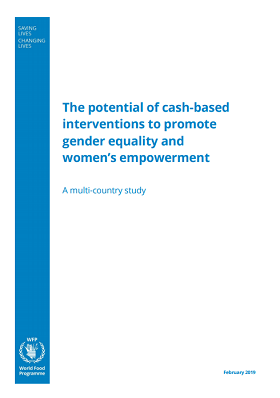The Potential of Cash-Based Interventions to Promote Gender Equality and Women’s Empowerment
The study on The Potential of Cash-Based Interventions to Promote Gender Equality and Women’s Empowerment sought to explore how CBIs can contribute to achieving gender equality and women’s empowerment (GEWE), as ends in themselves and for food security and nutrition outcomes. Where changes in GEWE were experienced, the study sought to understand women’s and men’s perceptions of how and why changes occurred. This is not an impact study or an evaluation. Instead, it is formative research to inform WFP’s policies, processes, programming and future research, such as the WFP CBT and Gender Impact Evaluation Window scheduled to start in 2019.
The study was guided by the following five questions:
(i) What GEWE outcomes have been achieved through or by CBIs?
(ii) How can CBIs contribute to GEWE, as ends in themselves and as needed for sustained food security and nutrition outcomes? Which programme features – programme governance or planning processes, transfer, conditionalities, complementary interventions, technology etc. – are essential for GEWE outcomes? (iii) What are the apparent causal linkages that may explain how and why CBIs contribute to achieving GEWE outcomes?
(iv) Where CBIs are used, how are/can market-related engagement (e.g. retailer engagement, markets for change, market support) contribute to GEWE?
(v) What are the institutional factors that enable the CBIs to contribute to achieving GEWE outcomes?



